Human Rights and Participatory Politics in Southeast Asia / Catherine Renshaw.
Material type: TextSeries: Pennsylvania Studies in Human RightsPublisher: Philadelphia : University of Pennsylvania Press, [2019]Copyright date: ©2019Description: 1 online resource (256 p.)Content type:
TextSeries: Pennsylvania Studies in Human RightsPublisher: Philadelphia : University of Pennsylvania Press, [2019]Copyright date: ©2019Description: 1 online resource (256 p.)Content type: - 9780812295764
- Human rights -- Southeast Asia -- History -- 21st century
- Human trafficking -- Investigation -- Southeast Asia -- History -- 21st century
- Political participation -- Southeast Asia -- History -- 21st century
- Women's rights -- Southeast Asia -- History -- 21st century
- POLITICAL SCIENCE / Human Rights
- African Studies
- Asian Studies
- Human Rights
- Law
- Middle Eastern Studies
- Political Science
- Public Policy
- 323.0959 23
- online - DeGruyter
| Item type | Current library | Call number | URL | Status | Notes | Barcode | |
|---|---|---|---|---|---|---|---|
 eBook
eBook
|
Biblioteca "Angelicum" Pont. Univ. S.Tommaso d'Aquino Nuvola online | online - DeGruyter (Browse shelf(Opens below)) | Online access | Not for loan (Accesso limitato) | Accesso per gli utenti autorizzati / Access for authorized users | (dgr)9780812295764 |
Frontmatter -- CONTENTS -- ABBREVIATIONS -- Introduction -- PART I. FOUNDATIONS: LEGITIMACY OF A REGIONAL HUMAN RIGHTS REGIME IN THE ABSENCE OF LIBERAL DEMOCRACY -- PART II. APPLICATIONS: ASSESSING THE REGIONAL DYNAMICS OF HUMAN RIGHTS COMMITMENT AND COMPLIANCE -- Conclusion -- Notes -- Index -- ACKNOWLEDGMENTS
restricted access online access with authorization star
http://purl.org/coar/access_right/c_16ec
In Human Rights and Participatory Politics in Southeast Asia, Catherine Renshaw recounts an extraordinary period of human rights institution-building in Southeast Asia. She begins her account in 2007, when the ten members of the Association of Southeast Asian Nations (ASEAN) signed the ASEAN charter, committing members for the first time to principles of human rights, democracy, and the rule of law. In 2009, the ASEAN Intergovernmental Commission on Human Rights was established with a mandate to uphold internationally recognized human rights standards. In 2013, the ASEAN Human Rights Declaration was adopted as a framework for human rights cooperation in the region and a mechanisim for ASEAN community building. Renshaw explains why these developments emerged when they did and assesses the impact of these institutions in the first decade of their existence.In her examination of ASEAN, Renshaw asks how human rights can be implemented in and between states that are politically diverse—Vietnam and Laos are Communist; Brunei Darussalam is an Islamic sultanate; Myanmar is in transition from a military dictatorship; the Philippines and Indonesia are established multiparty democracies; while the remaining members are less easily defined. Renshaw cautions that ASEAN is limited in its ability to shape the practices of its members because it lacks a preponderance of democratic states. However, she concludes that, in the absence of a global legalized human rights order, the most significant practical advancements in the promotion of human rights have emerged from regional institutions such as the ASEAN.
Mode of access: Internet via World Wide Web.
In English.
Description based on online resource; title from PDF title page (publisher's Web site, viewed 21. Jun 2021)


